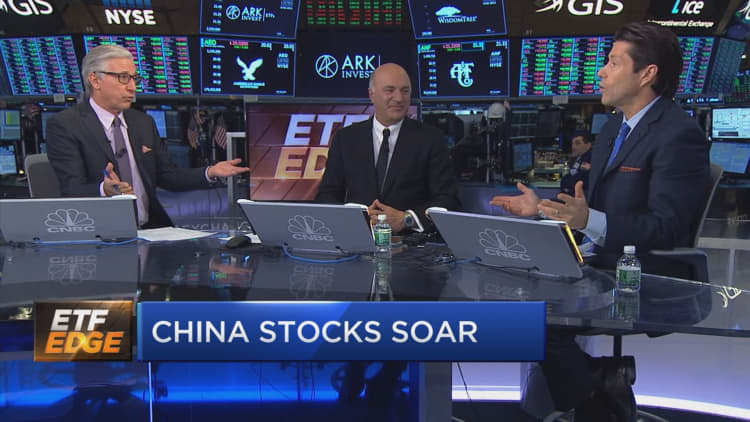
Chinese markets are having their best quarter in years.
The Shanghai Composite has surged 20 percent since the beginning of the year and is on track for its best quarter since 2014. That would also mark its first quarterly gain in six.
Kevin O'Leary, chairman of O'Shares ETFs and co-host of "Shark Tank," says exposure to the Asian markets is essential, during good times and bad.
"It's so hard to catch the knife with China," O'Leary said Monday on CNBC's "ETF Edge." "The volatility is twice what our market is, basically, and what I've learned is as an investor is you've got to suck it up and take the pain. If you want to have 5, 10, 15 percent in the Asian markets, which you should, you've just got to get ready for volatility in your portfolio. And it hurts."
The FXI China ETF, for example, moved 25 percent lower from its 52-week high set last February to the year's lows in October. Since then, it has rallied 17 percent.
"If you didn't have an allocation through this whole volatility to emerging markets, specifically Asia, you're now going to underperform the global index by a material amount," said O'Leary. "Having no exposure to emerging markets is always a mistake over a five-year period. That's what I've found. So you have to take the pain on volatility."
Tim Seymour, CIO of Seymour Asset Management, says sharp sell-offs last year have made for attractive valuations in Chinese stocks.
"In the short term, I actually think that Chinese stocks are not only cheap but technically, you have the Shanghai through the 200-day [moving average] for the first time in over a year, you've got a lot of important technical factors that is their wind at the back," Seymour said on Monday's "ETF Edge."
The FXI ETF holds 50 of the largest Hong Kong-listed stocks, including PetroChina and the Bank of China. The MSCI China ETF (MCHI) holds Hong Kong-listed, mainland China-listed and U.S. stocks, most notably Baidu and Alibaba.
"They are sort of correlated," said O'Leary. "The point is, if you want to own China, own them both because frankly, they're not that different and if you want to get every name, these are the two that captures them. But there's so many state-owned enterprises in there. That's funky chicken stuff. That's the problem."
The FXI ETF is up 13 percent this year, while the MCHI China ETF has increased 16 percent.
"I like FXI because I think a lot of the Chinese banks are particularly cheap and a lot of them look to be most vulnerable on the credit side in terms of a world where you're starving them from liquidity," added Seymour.
Disclosure: CNBC owns the exclusive off-network cable rights to "Shark Tank."




